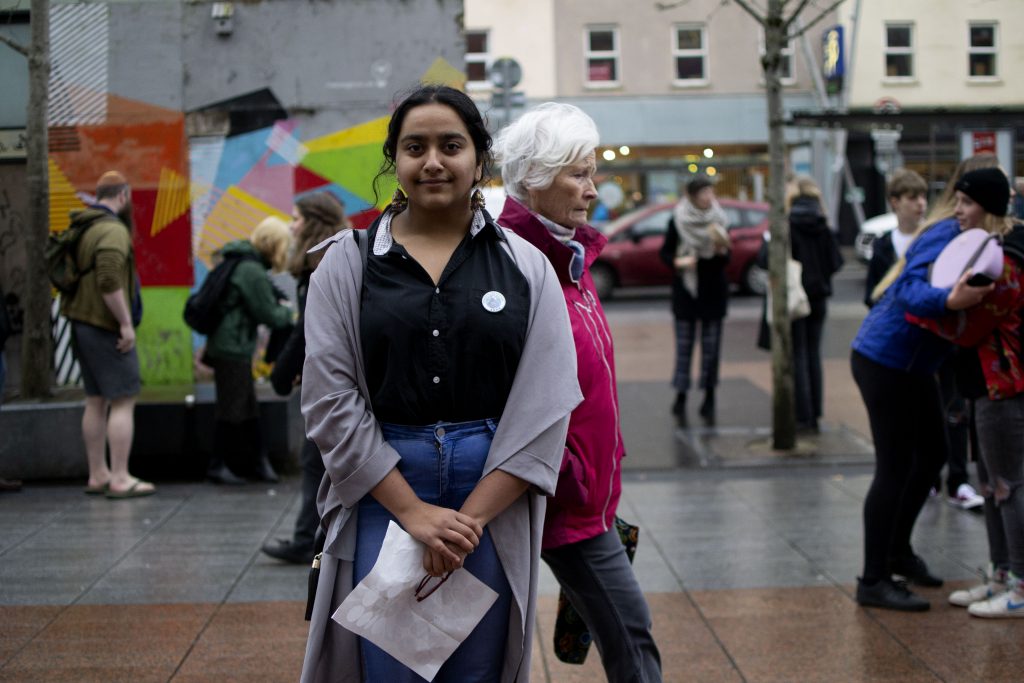‘Solidarity the way to go’ – climate strikers on COVID-19

March 24th, 2020
As the Coronavirus pandemic shutters public strikes and demonstrations, teenage climate strikers are labouring to find a powerful way to raise public awareness online about climate breakdown.
Saoi O’Connor, one of Ireland’s most prominent teenage strikers, says that the seriousness of the health emergency also makes highlighting the climate crisis doubly difficult.
Online harassment of climate strikers, she tells The Green News, has ramped up since the onset of the pandemic as some in self-isolation decide to spend their time shaming teenage activists.
“A lot of my Twitter mentions now are people saying, ‘there is a real crisis right now’, or ‘you just need to shut up,'” she says. Saoi says that she feels restless on Fridays now as her puts a pause to her weekly ritual of travelling from her hometown Skibbereen to Cork city to hold a climate vigil outside the Council offices.
“I feel like I’m still waiting for Friday, and I have been for the last three weeks, but we’ll make it work,” she says, as young Irish advocates for the planet’s health join their peers across the world to amplify their voices through digital strikes.

Bonding through crisis
Theresa Rose Sebastian, also from Cork, describes the online strikes as a way to pull together global members of Fridays for Future to draw attention to the climate crisis by naming and shaming politicians and fossil fuel companies.
“The theme for last week’s digital strike was ‘polluters out’ so were tagging big polluting companies like Shell, Chevron and Exxon Mobil, who are present at climate policy meetings and trying to tell them that they have no place there,” she explains.
Unlike public strikes, Theresa says, a digital protest is a powerful tool for capturing the attention of politicians and giant corporations. “I think for me, digital strikers have been useful in the sense that it allows me to directly call out people online.”
Many school strikers are buoyed by the intergenerational rapport building during this pandemic and hope that it will play a big role in tackling both the corona and climate crises
Saoi also points to another overlap between the current health crisis and the planetary one: a persistent blame game that only divides and hampers group efforts in every movement.
“It’s very easy for my generation to say that the older generations caused the climate crisis, and it’s very easy for the older generations to say that young people are spreading the Covid-19,” she says.
“I think it shows the human capacity to just blame the other and I hope this would lead to an understanding that solidarity is the way to go.”

First-World arrogance
In an international race to stop the spread of COVID-19, world leaders have imposed a series of restrictions on daily life that have largely halted industrial activities. This has led to a drastic short-term decline in emissions and air pollution in many countries, including China and Italy.
Both Saoi and Theresa believe that this shows that the world can returns closer to its natural state “if we stepped back from the system. Theresa is hoping that “this would register in our minds that the climate crisis might reach an irreversible stage that we need to take action now.”
Theresa, who has lived in India as a small child, believes that western Governments are scrambling to contain the new health emergency merely because it has impacted their turf – an approach that applies to their attitude to the climate crisis, she reasons.
A proud advocate of climate justice for the Global South, Theresa worries that eastern woes never trouble the west. “I was stuck through one of the worst floods in India, and no one reported it because it was happening in a developing country. I think now that the [virus] has impacted the Northern hemisphere, we hear about it,” she says.
“For western countries, psychologically, developing countries don’t matter as long as their crises won’t directly impact them.”
[x_author title=”About the Author”]







